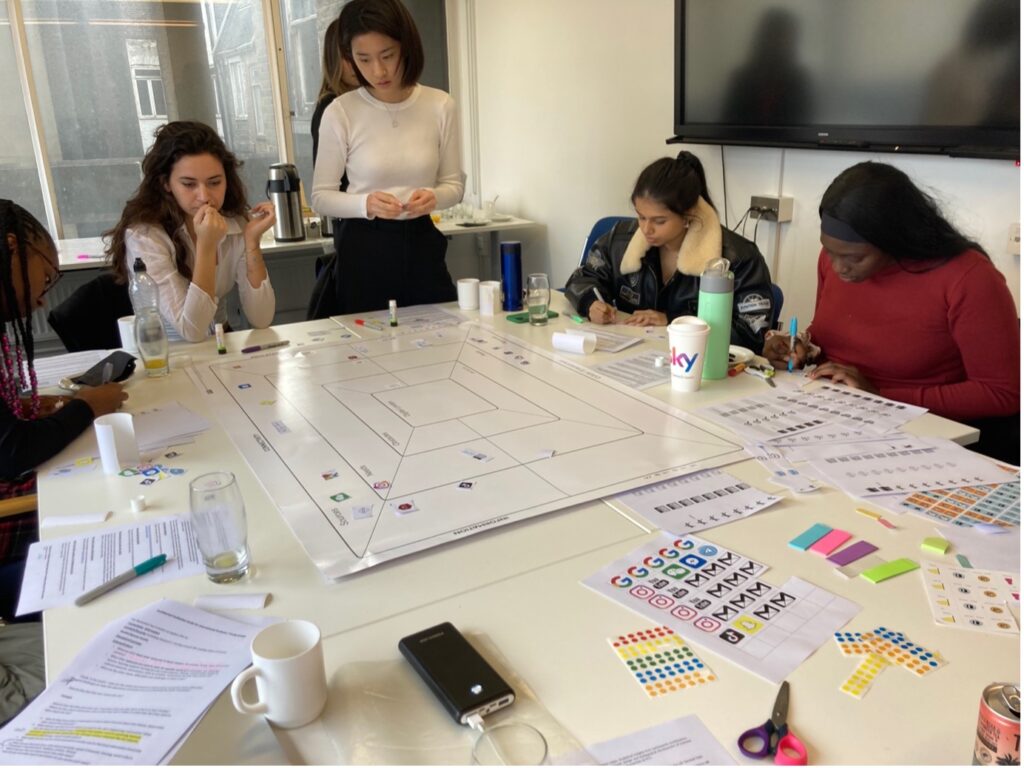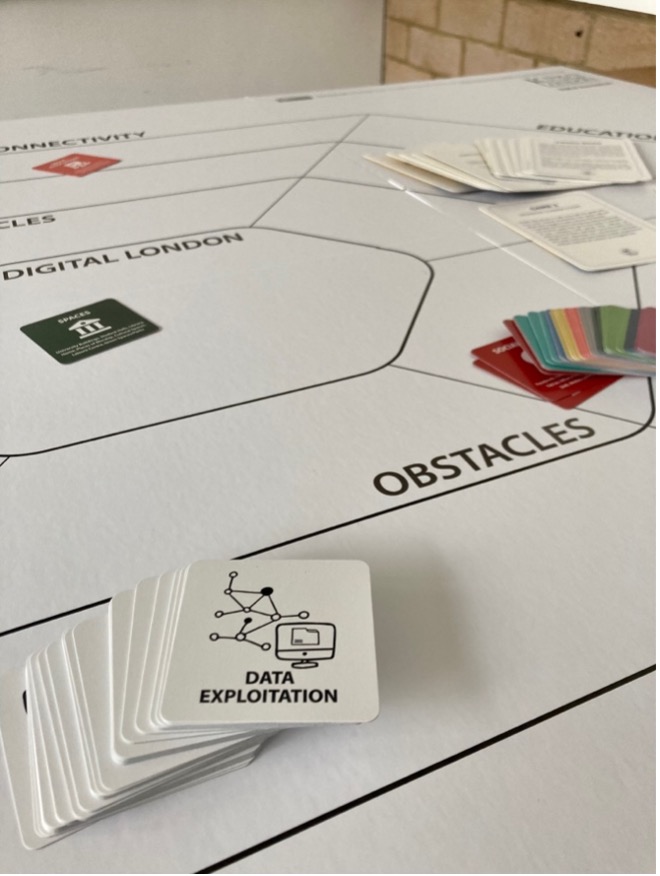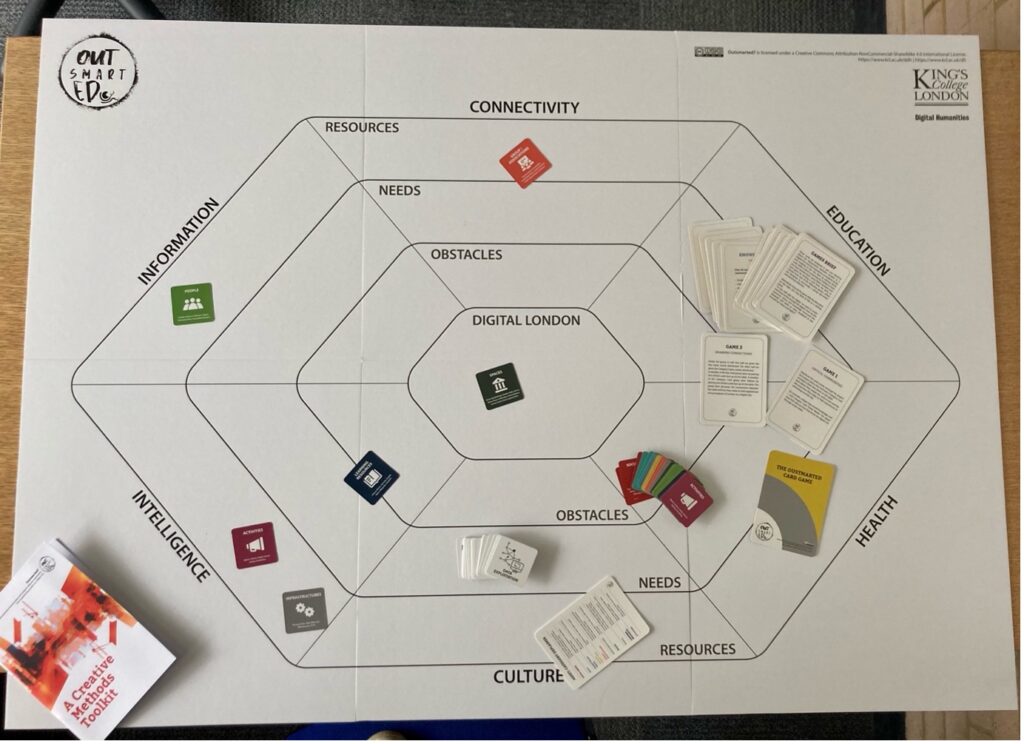Dr Giota Alevizou and Dr Mike Duggan
Student experience in a digital city
UK universities are an increasingly popular choice for international students, especially those seeking to experience life in multicultural, diverse centres indeed global cities such as London. Nonetheless, getting used to life in large diverse urban settings is not without its challenges. Several studies have reported students facing difficulties ranging from acculturation and socialisation, to datafication and surveillance. To address these challenges, digital media use and information sharing have become critical tools among students to mobilize resources or seize opportunities, but also, to deal with change, uncertainty or risks. The Outsmarted project sought to design an innovative participatory toolkit for understanding how our students met these challenges through and with digital media technologies. Amongst these technologies, understanding the impact of social media and mobility apps was a particular priority, as they have become primary sources for orientation among students, particularly prevalent in global cities such as London, often shaping spatial understandings and knowledge about communications infrastructures, networks and cultures that regulate young people’s life and access to the city’s material and symbolic resources.
In addition to London’s global standing, the city has been at the centre of debates and discourse regarding how digital media technologies are shaping contemporary urban life. It has been a space for experimentation, innovation and dissent surrounding digital models of urbanism – smart, data driven, algorithmic urbanism. For proponents, such models often promise the delivery of new efficiencies, conveniences, and, capacities. For critics, such models position users, or rather city dwellers, as actors devoid of agency or knowledge beyond the machine of urban administration. In The City is not a computer, Shannon Mattern argues that agency and local knowledge should be at the heart of urban intelligence. By studying student experiences in London, the Outsmarted team sought to understand how they make sense of, navigate, and, ultimately become dwellers of a city rapidly transformed by digital technology and smart devices.
The Outsmarted toolkit
Inspired by critical technology, urban and education studies, the Outsmarted project, led by Dr Alevizou, worked with KCL students from Digital Humanities and Liberal Arts to explore their experiences of London in terms of digital culture and communication infrastructures, places and spaces for knowledge, learning and leisure. Deploying a range of participatory pedagogies and qualitative methods, as well as creative and computational, systems thinking, it drew insights into students’ understanding of the ‘digital’ (culture, media, connections, networks and infrastructures and frames surrounding ‘appification’ and AI) through the city and with the city.

This involved a place mapping and ‘asset’ mapping events aiming to reflect on experiences and uses of media, apps and AI tools as well as considerations of resources, needs and obstacles across the following sectors: education and health, space, mobility and culture.
Discussions following the ‘mapping activities’ evoked a sense of participatory agency, as students contributed experiences as city dwellers and offered reflections surrounding challenges such as information/cognitive overload, mis/dis-information, surveillance as well as privacy concerns and tensions surrounding representation and algorithmic biases. Students reflected that ‘computational thinking’, and the creative, tactile elements of this methodology stimulated discussions that enabled them to collectively cultivate capacities for developing critical digital and AI literacies.
Funding from the Digital Futures Institute enabled us to further reflect upon the existing instruments of the asset mapping toolkit. We used student feedback to refine and reproduce both design and frameworks for discussion that involves a ‘knowledge game’. Deploying gamification, the toolkit can be used as board gameto:
- offer new ways to learn about how the digital and the algorithmic is embedded in civic, personal and public domains of life in cities & to reflect on how to make meaningful change
- to examine how sociality, subjectivity, and bias, affect become embodied practices within urban communication & digital infrastructures
We believe that deploying creative methods for enabling dialogue alongside conventional focus group and qualitative interviewing methods, allows for building an understanding of ‘knowledge’ or ‘intelligence’ around/through the ‘digital city’, and for, creating platforms for learning rights and for cultivating civic capacities. Living well with technology means engaging with technical processes and systems; recognizing that they are not neutral; and unpacking their agencies and their entanglement with how they are produced and used. It means awareness and intervention.



Future Plans
We will use this toolkit as a further learning resource, based on research- informed collaborative pedagogies for DDH’s modules in digital culture and media. A series of workshops will be advertised in the 2023-24 academic year for those wishing to learn more about the project and how to integrate the toolkit into their research and teaching and with a view to developing critical digital and AI literacies.
Funding
The Outsmarted project was jointly funded by the Faculty of Arts & Humanities as well the School of Education, Communication and Society at King’s College London. The design iteration and production of the Outsmarted toolkit was funded by the Digital Futures Institute. The toolkit builds upon participatory, capacity-building methodologies devised by numerous projects including the Media, Community and the Creative Citizen project and the UnBias AI project with further adaptions based on input of faculty and students from the Department of Digital Humanities at King’s College London.
The toolkit can be accessed online and cited as: Alevizou Giota, Duggan, Michael & Photini Vrikki. (2023). Outsmarted? A Creative Methods Toolkit for reflecting on experiences of London as a Digital City. Zenodo. https://doi.org/10.5281/zenodo.8341806
